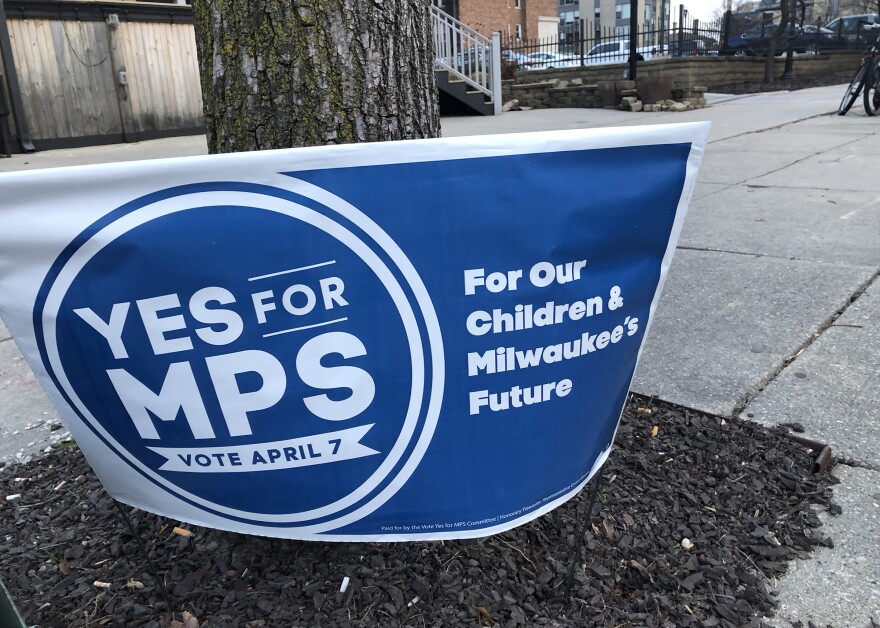Updated April 24, 6:23 p.m.
Milwaukee Public Schools will get an additional $87 million each year to spend on educational programming after voters overwhelmingly approved a referendum allowing the district to raise revenue through a property tax increase.
The referendum funding may help MPS deal with the repercussions of the COVID-19 pandemic, which shuttered schools indefinitely beginning mid-March.
>>Wisconsin Election Results — 2020 Spring General Election And Presidential Primary
Before the coronavirus hit, MPS leaders said the $87 million referendum was needed to give students the schools “they deserve.” School board members pointed out that many MPS students do not have full time art, music and physical education teachers. Classrooms are crowded. And the district has hundreds of uncertified emergency license teachers. The referendum is supposed to help change some of those things.
According to unofficial results, 78% of Milwaukee voters agreed to raise property taxes for the goal of improving educational options for students.
"I'm just elated," said MPS Board President Larry Miller Monday night, after the April 7 results were tallied.
Miller watched people stand in line for hours to vote at Riverside High School — one of the five consolidated polling places open in Milwaukee April 7.
"They came out so strongly to say, 'Yes, we need this,'" Miller said. "Even in a time when there are real economic problems and unemployment is increasing and there are the health issues with COVID-19. People are saying, 'We’re not going to forget our children.'"
"Even in a time when there are real economic problems and unemployment is increasing and there are the health issues with COVID-19, people are saying, 'we're not going to forget our children.'" - Larry Miller
But critics say some children are being forgotten by this referendum. Robert Rauh is in charge of the Milwaukee College Prep network, which has four charter schools authorized by MPS but run independently from the district. He says the referendum will not directly benefit students at charter schools like his, or the about 30,000 in private voucher schools.
"I believe MPS needs more funding, but we all need more funding." Rauh says. "Right now this referendum that 100% of city taxpayers are funding is only supporting 55% of students in the city because it’s only funding students who attend traditional MPS schools."
Rauh thinks funding increases need to happen at the state level, in, for example, special education support or full funding for four-year-old kindergarten.
Despite Milwaukee’s fractured education landscape, MPS advocates were able to organize a large coalition of community and political groups in support of the referendum. One of them is Leaders Igniting Transformation, or LIT, a youth activism group that is often critical of MPS.
LIT executive director Dakota Hall says the district should use this influx of money to help students of color — who are disciplined at disproportionate rates and have less access to advanced learning.
"Prioritize the growth of black and brown young people in this district," Hall says. "That looks like investing in more mental health support services like counselors and social workers, prioritizing restorative justice in schools instead of calling police. Hiring more black teachers and teachers of color to ensure representation in our schools matters."
There are a lot of ways MPS could spend the additional $87 million. But it’s not necessarily a life-changing amount for a district with a $1.2 billion budget and a projected $20 million deficit in the upcoming school year.
"All that money needs to stay inside the district and stay with those students. You don't cut services during a pandemic. You should actually increase services." - Dakota Hall
The district won’t even see the full $87 million until 2023. The increase is phased in over the next four years in an effort to minimize the tax impact, which is estimated to be an about $160 increase per $100,000 of property value annually.
At the same time the funding will start to kick in, Dakota Hall worries that Wisconsin’s GOP-controlled Legislature might cut school spending because of the COVID-19 economic downtown.
"We are ... preparing for that fight if they attempt to take money from MPS," Hall says. "Because all that money needs to stay inside the district and stay with those students. You don’t cut services during a pandemic. You should actually increase services."
It’s unknown how the pandemic will affect the district’s budget and spending priorities. But advocates say one thing is certain — more money will help MPS weather whatever storm is ahead.
Elsewhere in southeastern Wisconsin, school referendums were approved for Mequon, Cudahy and Kettle Moraine districts.
A recount that lasted six days and ended on April 24 confirmed a razor-thin victory for the Racine Unified School District's $1 billion referendum. The recount shows the referendum passing by just four votes, which is one less than the initial tally.
_






